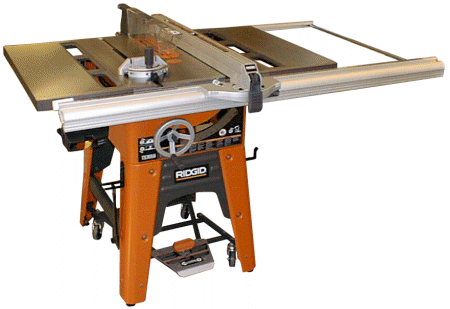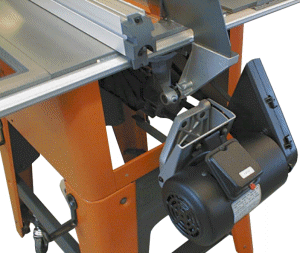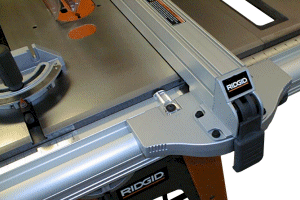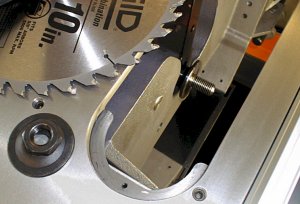|
|
|
| Description The Ridgid TS3650 Tablesaw is a left-tilt contractor saw made in Taiwan and powered by a 1.5 horsepower induction motor. At a glance, it is similar to many brands of contractor saws. It's price places it in the "low end" contractor saw category; however, I believe its features place it in the "high end" category which makes the TS3650 a very good value. |
 |
| The TS3650 is it about average on size; as with all
contractor saws, the motor hangs off of the back. Due to this, contractor saws tend
to require more of a footprint than all other saw types for an equivalent rip fence
capacity. The TS3650 fills a footprint of 15.3 square feet. The table height
is 36.5 inches which is just a tad high. The saw also comes equipped with a decent
40 tooth thin kerf carbide blade. Assembly |
|
|
Under the table |
Contractor saws have
the trunion mounted directly to the underside of the iron table (as opposed to the cabinet
like Cabinet Saws). The trunion design of the Ridgid is not typical however. A
typical contractor saw trunion consists of four major parts, fore and aft trunion brackets
and two large diameter rods connecting the trunion brackets. The (not too uncommon)
problem with this sort of design is that the rods can become twisted with respect to one
another and throw the alignment out. The TS3650 uses a cradle made of a single piece iron casting which seems to be very stout. It is attached to the table by two trunion brackets. These are made of Aluminim alloy for strength (to resist cracking). |
| Out of the box, I found the left T-slot
to be aligned to the blade by 0.001" over the distance of the blade meaning there was
no need to perform a trunion alignment in this regard. Trunion alignments on
contractor saws tends to be a little more tedious than other saws; Ridgid has done
something about this. On the back trunion they have incorporated an alignment device
(a cam lever) that will make the alignment process much easier should it be required. The table turned out to be pretty flat, the miter gauge slots are T-shaped; the slot width measured a few thousandths over 3/4" so all the standard aftermarket saw accessories should work fine. The two miter gauge slots are also measured parallel. The miter gauge itself is pretty standard but has no adjustments to fit the slot like many aftermarket gauges do, |
|
| The TS3650 motor is a TEFC (totally enclosed fan
cooled) type with an overload breaker. The saw uses what is known as a
"poly-vee" belt instead of a common "vee" belt for power transmission.
This also means that the saw is using machined pulleys instead of cheap stamped
steel units. Machined pulleys and link belts are common upgrade devices many
contractor saw owners feel compelled to buy to get the most out of their machines.
The Ridgid saw has these as standard equipment. The saw also incorporates an easy to remove and replace splitter / guard device. A single screw is all it takes to install the system onto the saw. Otherwise the splitter is a pretty standard design. |
 |
| Mobility The Herc-U-Lift mobile base is one of the more obvious features of the saw. The system is a sort of scissor jack on wheels and is very easy to operate. The system is completely within the footprint of the base so it doesn't stick out to get snagged on anything. To operate, one simply steps on a big paddle to raise the entire saw up. The 3" diameter castors make the whole machine very easy to roll and maneuver. To set in place, an orange pedal is depressed and the whole thing lowers (gently) to the ground. It is certainly encouraging to see a mobile base incorporated as standard equipment on a machine. |
|
| In Use I found all of the operator controls on the TS3650 to be easy to use and smooth operating. The power switch is a simple on/off (not magnetic) type and can be installed in more than one location. I found that the machine could be shut off by tapping the switch with my knee, not all saws have switches that will operate this way and I think it is an important safety feature worth noting. The blade raise / tilt functions are fairly high resolution at 10 turns per inch of raise and 29.5 turns for 45 degrees of tilt. There are adjustable stops for blade angle which can be accessed easily from the top of the table. Both the raise and tilt functions are accurate and easy to operate. The 1.5hp induction motor draws 13 amps according to the name plate or 6.5 amps if wired for 220 volt operation. If you are in the habit of ripping 10 foot long 2 inch thick Hard Maple slabs, you would find the saw underpowered. However, the motor size is typical of this class of saw and has plenty of power for most operations. The saw is a stable platform when ripping sheets of plywood, I'm sure those heavy cast iron wings help a little with that. I found that most of the time the saw would pass the "nickel test" through a complete power cycle. There is a small amount of vibration on the machine though. |
 |
Rip Fence When assembled in the standard configuration, the rip fence has a capacity of 36" to the right of the blade and 12" to the left. The rip fence is designed such that the rail could be easily assembled either shifted to the right or left several inches from this "standard" configuration. Since the saw is a left tilt machine, many owners might opt to shift the rails right 10 to 14 inches, this would yield a rip capacity of 46 to 50 inches to the right if one chose to do this. The rip fence has a fairly small head section with two cursors and a thumb wheel for moving the fence position in small increments. This thumb wheel is not a true micro-positioner and I did not find it to be very useful. |
| The rip fence locks on both the infeed and outfeed
side, this makes for a very rigid fence when locked down. I have heard several
uncomplimentary comments regarding the Ridgid rip fence but try as I may, I could never
find any significant fault with this system. A common upgrade to a low end
contractor saw is a better rip fence such as a Vega or Biesemeyer. When I evaluate
fence systems in my reviews, I try to do so with actual measurements so as to remove any
unjustifiable bias in the evaluation. Basically, the Ridgid rip fence is as good as
any of the "upgrade" fences I have measured. Measurements: With the rip rails waxed, the fence was very easy to slide into the desired position and easy to operate. The cursors are magnifier types and work without distorting the reading (not all cursors work so well). The cursor lines are a little fat which accounts for part of the repeatability measurement above. The locking handle is plastic and seems strong enough. The tapes are already installed onto the rails so if the rails were not installed in the suggested position, new tapes would have to be applied. |
|
| Arbor The arbor is a standard 5/8" acme screw shaft. When measured, I found no flange runout (meaning it was far below 0.001"), the measured arbor shaft runout was 0.001". A full dado stack (about 3/4" wide) can be fitted to the arbor but (as explained in the manual) not with the arbor washer. The trunion is open on the blade access side but a removable plastic plate covers the side. This effectively creates a shroud and there is another plastic part at the bottom of the trunion with a 2" diameter port which will connect to a standard shop-vac hose. The DC port does a pretty good job at collecting dust below the table. |
 |
| I have seen reports on the web that some owners claim the reduced diameter area on the arbor near the flange is allowing a cutter in a stacked dado set to not be in line with the rest of the cutters. When I measured the arbor on this machine I did not find there to be any problem. None the less, at the time of this writing (Dec 2004), Ridgid is addressing the problem and providing replacement arbors to those who need them. | |
| Summary I find the Ridgid TS3650 to have quite a few high-end features that belie its low-end price tag. The saw comes with two cast iron wings, a mobile base, an excellent rip fence, a stout trunion design, a trunion alignment aid, a dust collection shroud, and a poly-vee belt drive. Without these items, the Ridgid would be just another okay saw, with these, I believe it is an exceptional value and competes easily with saws costing much more.
In the interest of full disclosure Ridgid provided this product to facilitate this review. |